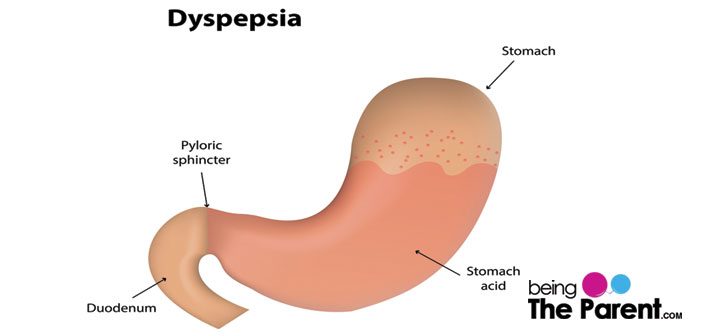
Indigestion During Pregnancy
6 min readWritten by Editorial Team


Once the queasiness of early pregnancy melts away, most of the expecting mothers anticipate they can again start to eat food without any issues. Unfortunately, this expectation lasts only until indigestion makes its way in. Though this discomfort can occur anytime during gestation, the symptoms generally appear in the second and third trimesters.
Most of the expecting mothers are found to experience indigestion in the course of pregnancy. The odds of experiencing a totally indigestion-free pregnancy are thin to none. The good news is pregnancy-induced indigestion can be easily treated and it ought to vanish soon after delivery.
In This Article
- What is Dyspepsia or Indigestion?
- Why Are Expecting Mothers Prone to Indigestion?
- Does Indigestion Have Any Harmful Effect on the Baby in the Womb?
- Symptoms of Indigestion During Pregnancy
- Causes of Indigestion During Pregnancy
- 7 Simple Tips to Prevent Indigestion During Pregnancy
- How Can Indigestion During Pregnancy be Treated?
- Which Foods Can Cause Indigestion During Pregnancy?
What is Dyspepsia or Indigestion?
Indigestion, also called dyspepsia, refers to digestion related pain or distress in the abdomen. The signs of dyspepsia can be more annoying for an expecting woman than a woman who is not pregnant.
Why Are Expecting Mothers Prone to Indigestion?
Expecting mothers are prone to indigestion mainly because of two reasons. The foremost reason is the hormonal change. The pregnancy hormone, relaxin—which is responsible for loosening the joints and connective tissue for a trouble-free delivery— also slows down the digestion process, which means food stays in the stomach longer, triggering more acid production.
Secondly, the developing child applies pressure along both the abdomen and the lower valve of the esophagus. This increases the probability of stomach contents along with the gastric juices to flow upwards into the esophagus triggering the vomiting sensation and pain.
An expecting mother will be more prone to indigestion if:
- She has experienced indigestion issues before she is pregnant.
- She is carrying more than one baby.
- This is not her first pregnancy.
Does Indigestion Have Any Harmful Effect on the Baby in the Womb?
No. Though uncomfortable and sometimes painful for the expecting mother, indigestion causes no harm to the baby.
Symptoms of Indigestion During Pregnancy
The signs of indigestion can range from lenient (mostly) to severe (rarely). The symptoms of indigestion include one or more of the following conditions:
- Heartburn, the burning feeling which ascends from the abdomen. It can also feel from lower chest ascending towards the neck
- Pain or uneasiness in the upper stomach
- Queasiness and vomiting sensation
- Bloating
- Feeling “full” in between (or after) a small meal
The signs of indigestion have a tendency to happen in sessions, appearing and disappearing, rather than persisting throughout the day. The symptoms are found to increase both in frequency and in severity towards the last trimester.
Causes of Indigestion During Pregnancy

The disturbing symptoms of indigestion during pregnancy are due to acid reflux. That is, leakage of the acids produced in the stomach flowing into the food pipe or esophagus. Unlike the stomach, the esophagus cannot fight off the damages caused by the acid, if an unusual amount of acid refluxes into it. If the acid from the stomach enters the food pipe, it can cause inflammation on its lining bringing about all the disturbing symptoms like pain, burning sensation, etc.
The esophagus is protected by a circular band of muscle called the lower esophagus sphincter (LES) which acts as a valve– allowing the food from the food pipe to pass into the stomach tightens so as to not allow the contents of the stomach to reflux into the esophagus. This function of the sphincter gets affected in the course of pregnancy, mainly due to two reasons:
1. Rising Levels of Hormones
Hormonal reasons are more applicable for indigestion during the first trimester of pregnancy. Pregnancy hormones (estrogen and progesterone), are profusely produced by the body during early in pregnancy. One of the purposes of the pregnancy hormone is to relax the muscle tissues throughout your body. This includes the gastrointestinal tract.
A relaxed tract slows the digestive processes, which can cause bloating, indigestion, gas formation, and pain. Also, lower esophagus sphincter, which separates the esophagus from the stomach can also relax, allowing the gastric acid from the stomach to flow upwards.
2. Increased Pressure on the Stomach
This reason is behind the symptoms of indigestion during the later stage of the pregnancy. As the baby grows in size, the growing uterus puts increased pressure on the stomach as it presses against it. This will result in refluxing the acid and stomach contents back into the esophagus.
[Read : How Does The Uterus Change During The 3 Trimesters Of Pregnancy?]
7 Simple Tips to Prevent Indigestion During Pregnancy
You will most likely need to adjust with some heartburn during pregnancy. Yet,there are several tips to prevent the frequency and intensity of indigestion.
1. Early Dinner
The symptoms of indigestion are found to cause more trouble during the night. Therefore, eat the dinner at least two hours prior to the bedtime. Also, always maintain a straight posture.
2. Avoid Large Meals
During the daytime, instead of having three large meals, increase the frequency of the meals and decrease their quantity.
3. Elevated Posture of the Upper Body
Keep your upper body a little elevated than lower body while sleeping or lying down. A few inches can be added to the headrest part of the bed by putting a couple of extra pillows beneath the mattress or by placing wooden blocks or bricks under the legs of the bed. This slightly inclined position will prevent the ebb of the acid into the esophagus to some extent.
4. Never Bend on Waist
Never bend at your waist during pregnancy. If needed, bend your knees. Bending at the waist increases the pressure inside the stomach.
5. Never Drink Water During a Meal
You can always drink water before or after a meal.However, drinking water during a meal can increase the chances of indigestion.
6. Never Rush Through Meals
Eat slowly and make sure you properly chew the food before swallowing.
7. Wear Loose Fitting Clothes
Never wear clothes that are tight around the waist or stomach.
How Can Indigestion During Pregnancy Be Treated?
If the preventive measures don’t help and the symptoms of indigestion are bothering you, consult your doctor. Never go for an over the counter medicines without getting a green signal from the doctor. Medications available to treat indigestion during pregnancy are:
1. Antacids
These medicines are alkaline liquids or tablets, used to neutralize the gastric acids, providing immediate relief from the symptoms of indigestion. Only the recommended dose should be consumed while pregnant.Don’t take antacids with your routine iron supplement. It prevents the absorption of iron. Therefore, both should be taken a couple of hours apart. Never use antacids containing aluminum, sodium carbonate or sodium citrate.
[Read : How Safe Is To Take Antacids During Pregnancy?]
2. Alginates
These are generally taken along with the antacids. The purpose of alginatesis to react with the gastric acids to form a gel.This gel floats on the top of the content of the stomach and prevents the reflux of the stomach content into the food pipe.
If acid-neutralizing medicines don’t work out your doctor will prescribe acid-suppressing medicines like:
3. Omeprazole
This acid suppressing tablet, taken regularly (one per day), has found to be an effective way to suppress the gastric acids. Though the odds of the safety of taking this medicine in the course of pregnancy are in favor of omeprazole, we cannot ignore the fact that, it belongs to category C rating in U.S food and drug administration (FDA).
4. Ranitidine
This is a substitutable medicine for omeprazole. This medicine minimizes the quantity of acid produced in the stomach. This medication is prescribed for expecting mothers for many years and no issues are reported so far. This medicine has to be taken twice a day, regularly (with or without the symptoms), for good results.
[Read : Ranitidine During Pregnancy]
Which Foods Can Cause Indigestion During Pregnancy?
Identifying and eliminating the food that triggers indigestion can help to prevent the symptoms of indigestion during pregnancy. Some food stimulates relaxation of the lower esophagus sphincter. Remember that, not all the food mentioned here will always trigger indigestion. The effects vary from person to person. However, most commonly found indigestion-causing foods are:
- Citrus fruits
- Carbonated drinks
- Alcohol
- Caffeine
- Fried foods
- Oily foods
- Tomatoes
Some other foods can also cause indigestion. Therefore, it is better to maintain a diary, entering all the food and drinks you have had (do not forget to enter time) daily. This will help you to pin down the food, which cause indigestion and avoid it in the course of pregnancy.

Editorial Team,
With a rich experience in pregnancy and parenting, our team of experts create insightful, well-curated, and easy-to-read content for our to-be-parents and parents at all stages of parenting.Read more.
Responses (0)
Want curated content sharply tailored for your exact stage of parenting?
Related articles

Vaginal Examinations During Labor – Importance, Frequency and Types

300 Popular Baby Names That Mean Weather With Meanings

Heartburn During Pregnancy – Causes, Symptoms and Preventive Measures

Electric Blanket During Pregnancy

Pseudoephedrine During Pregnancy – Safety, Dosage and Side Effects

Top Baby Girl Names That Start With J
Sponsored content
Discover great local businesses around you for your kids.
Get regular updates, great recommendations and other right stuff at the right time.





